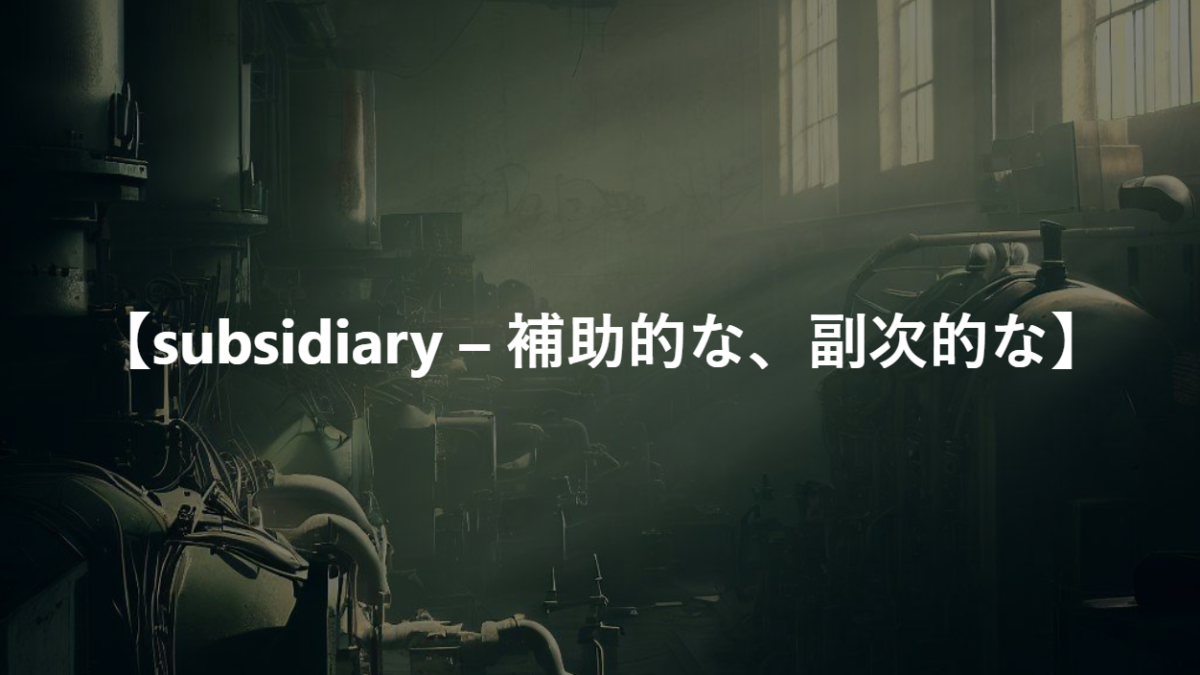語源・類義語・反対語・例文
【subsidiary – 補助的な、副次的な】という単語の語源とか由来を知っていますか?
「subsidiary」という単語は、ラテン語の「subsidiarius」から来ており、これは「subsidium」から派生しています。「subsidium」という言葉は、支援、助け、または援助を意味し、「subsidere」という言葉から来ています。これは、「座る」または「落ち着く」を意味します。「sub-」という接頭辞はラテン語で通常、「下に」または「以下に」という意味がありますから、「subsidium」によって最初に伝えられたアイデアは、何かが他のものの下にまたは後ろに座ってそれを支えるというものでした。
時間が経つにつれ、「subsidiary」は支援を提供するもの、または二次的な役割を果たすものという意味を持つようになりました。それは、他の何かを強化したり補完したりするものです。ビジネスの文脈では、「subsidiary」は別の、より大きな実体である親会社によって支配される会社を指します。このビジネス関係は、補助会社が親会社の運営を支援または補完するという用語の元の意味を反映しています。
The word “subsidiary” comes from the Latin “subsidiarius,” which is derived from “subsidium.” The term “subsidium” means support, help, or assistance and is itself derived from “subsidere,” which means to sit down or settle. The prefix “sub-” in Latin typically means “under” or “below,” so the original idea conveyed by “subsidium” was something that sits down under or behind something else to support it.
Over time, “subsidiary” has come to mean something that provides assistance or serves a secondary role, reinforcing or supplementing something else. In a business context, a “subsidiary” refers to a company that is controlled by another, larger entity, which is known as a parent company. This business relationship reflects the original meaning of the term, where the subsidiary supports or complements the parent company’s operations.
この単語の類義語・反対語を教えてください。
類義語
- Auxiliary: 補助的な、支援的な
- Supplementary: 補足的な、追加の
- Secondary: 第二の、二次的な
- Supportive: 支援的な、後援の
- Ancillary: 補助的な、従属的な
- Accessory: 付属的な、副次的な
- Complementary: 補完的な、相補的な
反対語
- Primary: 主要な、第一の
- Principal: 主要な、主となる
- Main: 主な、中心的な
- Central: 中心的な、核心の
- Leading: 先導的な、主導的な
- Major: 主要な、大きな
- Independent: 独立した、自主的な
この単語に似た単語で間違いやすい単語はありますか?
- Subsidy vs. Subsidiary:
- Subsidy(補助金、助成金): 経済的援助、特に政府や他の機関からの金銭的支援を意味します。
- Subsidiary(補助的な、副次的な): 何かを支える、補助する、または従属するものを指します。
- Subsistence vs. Subsidiary:
- Subsistence(生存、自給自足): 生きるために必要な最低限の手段や資源を意味します。
- Subsidiaryは補助的または副次的な役割や関係を示します。
- Submissive vs. Subsidiary:
- Submissive(従順な、服従的な): 他人の権威に従う、または服従する性質を表します。
- Subsidiaryは、補助的な役割や機能に関連しています。
この単語を使った例文を5つほど教えてください。
The main report includes the findings of the research, while the subsidiary document provides additional data.
主なレポートには研究結果が含まれており、補助的な文書では追加のデータが提供されています。
The subsidiary company handles the distribution of our products in overseas markets.
子会社は、海外市場での製品の流通を担当しています。
The new law has a subsidiary role in supporting the main regulations.
新法は、主要な規制を補完する役割を持っています。
The CEO of the parent company visited the subsidiary office to assess its performance.
親会社のCEOは子会社のオフィスを訪れ、その業績を評価しました。
The subsidiary task force was established to address the specific issue at hand.
特定の問題に対処するために、補助的なタスクフォースが設置されました。
【subsidiary – 補助的な、副次的な】のコロケーション
- Subsidiary company: 子会社。これは、他の企業(通常は親会社と呼ばれる)によって所有または制御されている会社を指します。子会社は、親会社の支援を受けつつも、独自の運営を行うことが一般的です。
- Subsidiary role: 補助的な役割。これは、主要な役割や目的をサポートするために存在する二次的または補助的な役割を示します。この用語は、ビジネス、演劇、映画、組織構造など、さまざまな文脈で使用されます。
- Subsidiary office: 支店または支社。これは、主要な事務所や本社から地理的に分離された場所に設置されるオフィスを指します。支店は、特定の地域内での業務を担当し、本社の補助的な機能を果たします。
- Subsidiary rights: 副次的な権利。出版や映画製作の文脈でよく使われ、著作権やその他の知的財産の特定の使用権を指します。これには、翻訳権、映画化権、商品化権などが含まれることがあります。
- Subsidiary legislation: 補助的な立法または副次的な法規。これは、より高位の法律や権限に基づいて制定される法律や規則を指します。補助的な立法は、主要な法律の実施の詳細を定めるために用いられます。
「subsidiary」という単語は、様々な文脈で補助的または副次的な要素を指すために使用されます。ここでは、「subsidiary」に関連するいくつかの一般的なコロケーションについて詳しく見ていきましょう。
まず、「Subsidiary company」は子会社を意味します。これは、他の企業、通常は親会社と呼ばれるものによって所有または制御されている会社のことです。子会社は、親会社からの支援を受けながらも、独自の運営を行うことが特徴です。
次に、「Subsidiary role」とは、補助的な役割を指します。これは、主要な役割や目的を支えるために存在する二次的または補助的な役割を示す表現で、ビジネス、演劇、映画、組織構造など、さまざまな分野で使用されます。
「Subsidiary office」は、支店または支社を指す言葉です。これは、本社や主要な事務所から地理的に分離された場所に設置されるオフィスのことで、特定の地域内での業務を担当し、本社の補助的な機能を果たします。
また、「Subsidiary rights」とは、副次的な権利を意味します。これは出版や映画製作の文脈でよく使われ、著作権やその他の知的財産の特定の使用権を指します。これには、翻訳権、映画化権、商品化権などが含まれます。
最後に、「Subsidiary legislation」とは、補助的な立法または副次的な法規を意味します。これは、より高位の法律や権限に基づいて制定される法律や規則を指し、主要な法律の実施の詳細を定めるために用いられます。
これらのコロケーションを通じて、「subsidiary」という単語が示すのは、何か他のものを支える、補う、または補完する補助的または副次的な性質や機能です。この単語は、企業構造、法的文書、物理的な場所、権利の配分など、多岐にわたる文脈で使用されています。
The term “subsidiary” is used in various contexts to denote auxiliary or secondary elements. Let’s delve into some common collocations associated with “subsidiary.”
First, “Subsidiary company” refers to a subsidiary company. This is a company that is owned or controlled by another entity, typically referred to as the parent company. A characteristic feature of a subsidiary company is that, while it receives support from the parent company, it operates independently.
Next, “Subsidiary role” points to an auxiliary role. This expression denotes a secondary or supportive role that exists to bolster a primary role or purpose. It is used in various fields such as business, theater, film, and organizational structures.
“Subsidiary office” refers to a branch or subsidiary office. This term describes an office located geographically separate from the main or head office, responsible for handling operations within a specific region and serving a supplementary function to the headquarters.
Moreover, “Subsidiary rights” mean subsidiary rights. Commonly used in the context of publishing and filmmaking, this term refers to certain rights for the use of copyright or other intellectual property. This includes translation rights, film adaptation rights, merchandising rights, and more.
Lastly, “Subsidiary legislation” stands for auxiliary legislation or subsidiary regulations. It denotes laws or rules enacted based on higher laws or authority, used to detail the implementation of primary legislation.
Through these collocations, the word “subsidiary” signifies the nature or function of something that supports, complements, or supplements something else. This term is employed in a wide range of contexts, including corporate structures, legal documents, physical locations, and allocation of rights.
文法問題: “subsidiary” (補助的な、副次的な)
- 品詞と使い方:
The company’s main focus is on its core business, but it also has several _________ operations in other industries.
(A) subsidiary
(B) subsidiaries
(C) subsidize
(D) subsidized
解答と解説: (B) subsidiaries 空欄には名詞が必要です。subsidiaries は「子会社」という意味の複数形の名詞で、文脈に合っています。
– - 名詞形:
The company’s _________ in Asia is responsible for manufacturing and distribution in that region.
(A) subsidiary
(B) subsidiaries
(C) subsidize
(D) subsidized
解答と解説: (A) subsidiary 空欄には主語となる名詞が必要です。subsidiary は「子会社」という意味の単数形の名詞です。
– - 形容詞形:
The _________ issues were not addressed in the main meeting, but will be discussed in a separate session.
(A) subsidiary
(B) subsidiaries
(C) subsidize
(D) subsidized
解答と解説: (A) subsidiary 空欄には名詞 issues を修飾する形容詞が必要です。subsidiary は「補助的な」「副次的な」という意味の形容詞です。
– - 反意語:
The company’s _________ business is its most profitable division.
(A) subsidiary
(B) core
(C) secondary
(D) auxiliary
解答と解説: (B) core 文脈から、空欄には subsidiary の反意語が入ることがわかります。core は「中核的な」「主要な」という意味なので、適切です。
– - 誤文訂正: The government provides subsidies to the subsidiaries companies to promote economic growth.
解答と解説: subsidiaries companies → subsidiary companies subsidiary は形容詞なので、名詞 companies を直接修飾することができます。

